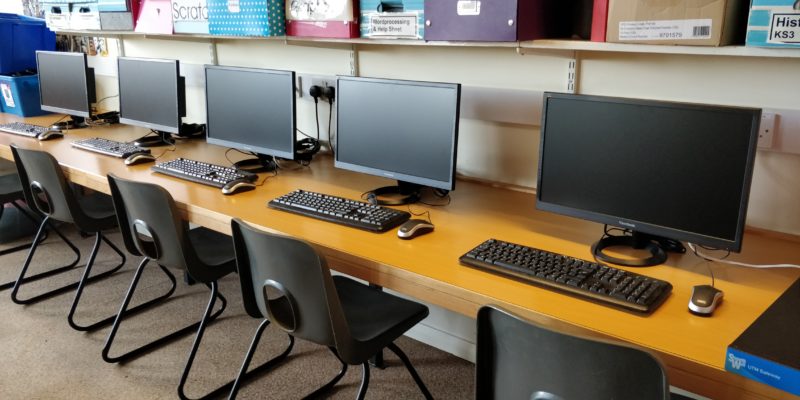Curriculum Statement
The ICT and Computing Curriculum is designed to develop the technical skills required to enable students to be creative and independent users of technology. In the process students will understand the importance, and develop their precision, accuracy and resilience. The rapidly changing nature of technology means that students are necessarily taught the need to continue their learning throughout life.
ICT, Information Communication Technology is defined as any technology or device that has the capacity to acquire, store process and transmit information and can include personal computers, the internet, mobile communication devices and email.

In this fast changing world it is important for students to see ICT as a useful tool to enhance the learning process. The school continues to invest in resources to enable teaching strategies that allow students to move to higher-order thinking, develop constructive thinking skills, and learn to prepare themselves for the future information age.
ICT is integrated into many subjects so that the students get as much exposure to using ICT in different environments as possible. ICT is also taught as a standalone subject throughout Key Stage 3 and as an option for all students at Key Stage 4.
KS3
Years 7, 8 and 9 follow a creative and motivational curriculum allowing the students to study a variety of topics to achieve a broad skill base and knowledge in preparation for KS4.
Students focus on ...
In year 7 the students learn the importance of file management and are introduced to Cloud Technology through their school email. The students are introduced to Scratch, a creative and fun application that provides scope for imagination and at the same time are trained to work accurately with programming blocks. As soon as the students are familiar with the school network and confident in their ICT skills they move on to a graphics project. The project is divided into two sections to learn about bitmap images as well as line vector images. The students once again are able to be creative but also understand the importance of working carefully and sequencing instructions in the correct order. The students are taught how to evidence the development of their work as well as obtain feedback to assist the development process.
In year 8 the students develop their spreadsheet skills. The ability to transfer a paper based system to an electronic one is a key skill. Students must use the correct formulae, use suitable formatting and choose the most appropriate graph to display the data. The students also are introduced to business skills using business terminology of cost, income, profit and loss. The students learn financial life skills and how a spreadsheet can help with planning their own personal finances in later years.
KS4 (BTEC Digital Information Technology)
Students in KS4 have the option to study Digital Information Technology where they will be assessed under three different components. These components have been designed to demonstrate application of the conceptual knowledge underpinning the sector through realistic tasks and activities. This style of assessment promotes deep learning through ensuring the connection between knowledge and practice.
Components 1 and 2 are assessed through non-exam internal assessment.
Component 3 is assessed through an external exam-based assessment. The design of this external assessment ensures that there is sufficient stretch and challenge, enabling the assessment of knowledge and understanding at the end of the learning period.
Assessment
KS3: Skills and knowledge are marked to ensure progress is taking place throughout the term. Each student presents their evidence in a portfolio of work. Where accumulative projects are set this is marked on completion of the project.
KS4: Students will complete the following component assessments, as described below.
Learners will develop their understanding of what makes an effective user interface and how to effectively manage a project. They will use this understanding to plan, design and create a user interface.
Learners will understand the characteristics of data and information and how they help organisations in decision making. They will use data manipulation methods to create a dashboard to present and draw conclusions from information.
Learners will explore how organisations use digital systems and the wider implications associated with their use.
- Component 1: Internal assessment – externally moderated
- Component 2: Internal assessment – externally moderated
- Component 3: External assessment (90 minutes)
Homework
KS3: Homework will be given at regular intervals and will make use of resources on GCSE pod.
KS4: Homework at KS4 will be built around deadlines for completion of coursework tasks and will be given at appropriate times throughout the year.
Support at Home
Share your own ICT/tablet skills with your child. Help them see the practical aspects of ICT at home e.g. managing household bills online.
Additional Support in school and/or resources
Access to the ICT room at break times/lunchtimes. Use of free programmes where suitable so pupils can continue developing skills at home. E.g. Python, Microbit.org. Ability to download Microsoft Office with their Office 365 email address.
Extra-Curricular
The ICT room is available every lunchtime for all year groups to use for homework, coursework or any other ICT skill practice.
Deep Learning Days are used throughout each year to ensure all students can be active and safe citizens of the online world. We develop their understanding of how to stay safe in all aspects of their online life as well as the different type of threats to the security of their data and online existence.

